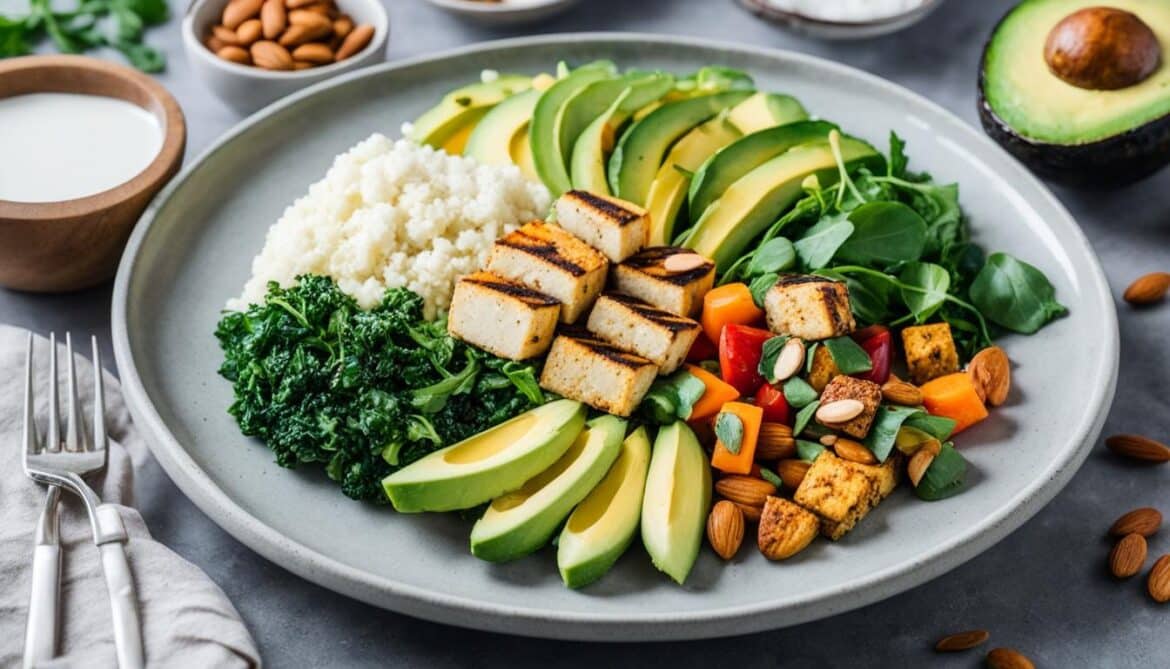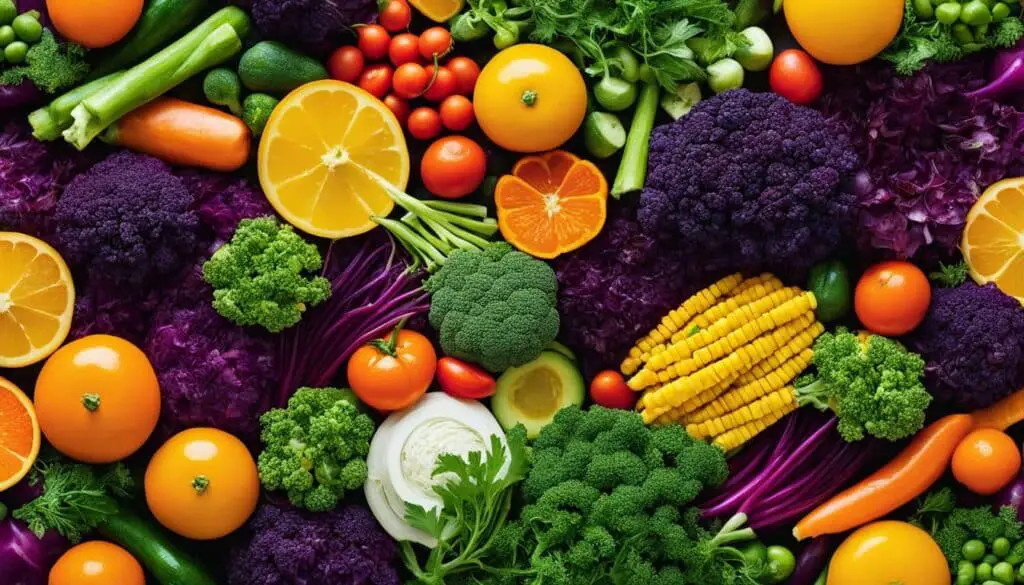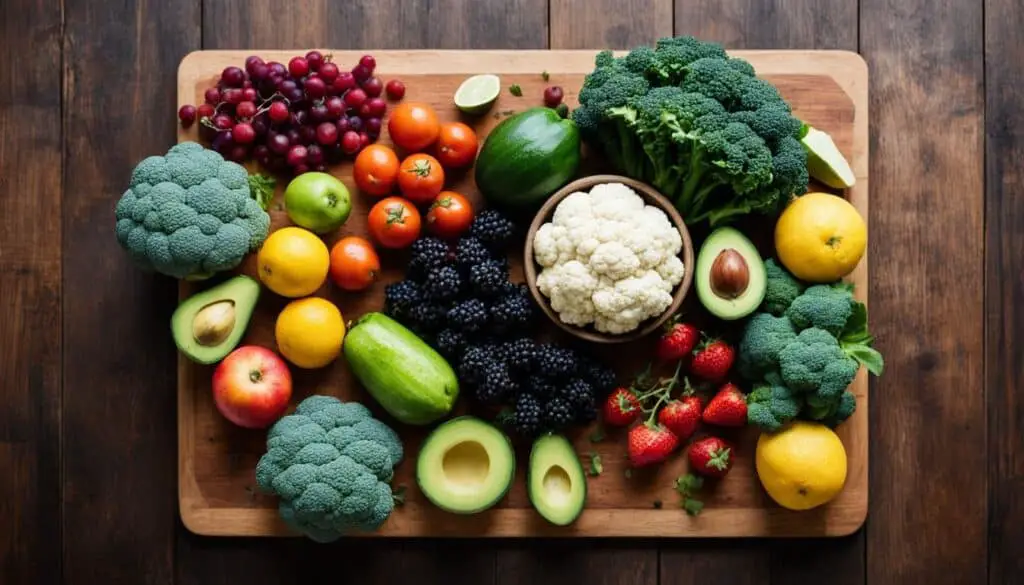As I strive for a healthier lifestyle, I am constantly exploring new dietary approaches that nourish both my body and mind. One approach that has gained significant popularity is the vegetarian keto diet. Combining the principles of plant-based eating with the low-carb, high-fat philosophy of the ketogenic diet, this unique approach offers a promising path to weight loss.
The vegetarian keto diet focuses on bringing together the best of two worlds – the nutrient-rich benefits of a plant-based diet and the weight-loss potential of the ketogenic lifestyle. By eliminating animal products and minimizing carbohydrates, this diet encourages the body to enter a state of ketosis, where it burns fat for fuel instead of carbohydrates.
Key Takeaways:
- The vegetarian keto diet combines the principles of plant-based eating and the ketogenic lifestyle.
- By eliminating animal products and minimizing carbohydrates, the body enters ketosis.
- This diet promotes weight loss by utilizing fat as fuel.
- The vegetarian keto diet demonstrates the potential for a balanced and sustainable approach to weight management.
- Before starting any new diet, it’s important to consult with a healthcare professional to ensure it aligns with individual nutritional needs and goals.
Understanding the Holistic Approach to Nutrition
The holistic approach to nutrition recognizes the interconnectedness of physical, mental, emotional, and spiritual health. By encompassing all these elements, holistic nutrition aims to achieve optimal well-being. Incorporating plant-based ingredients into our diets can be a crucial step towards this goal, as they provide essential nutrients and support a healthy lifestyle.
“The food you eat can be either the safest and most powerful form of medicine or the slowest form of poison.” – Ann Wigmore
Nutrition is not just about eating the right foods; it’s about nourishing our bodies from the inside out and considering the impact food has on our entire being. The holistic approach emphasizes the quality of the ingredients we consume and their ability to promote overall wellness.
When we adopt a holistic approach to nutrition, we prioritize fresh, whole, and unprocessed foods. These plant-based ingredients, such as fruits, vegetables, whole grains, legumes, nuts, and seeds, are rich in essential vitamins, minerals, antioxidants, and fiber. They provide the necessary building blocks for our bodies to thrive and support a wide range of bodily functions.
Benefits of a Holistic Approach to Nutrition
1. Improved Digestive Health: By focusing on whole, natural foods, the holistic approach promotes a healthy digestive system. These foods are often easier to digest and contain fiber that supports regular bowel movements and the growth of beneficial gut bacteria.
2. Enhanced Mental Clarity: A nutrient-dense diet can contribute to improved mental clarity, focus, and overall brain health. Certain plant-based ingredients, like omega-3 fatty acids found in flaxseeds and walnuts, have been linked to better cognitive function and reduced risk of cognitive decline.
3. Boosted Energy Levels: The combination of complex carbohydrates, fiber, and essential nutrients found in plant-based foods provides a sustained release of energy. This helps prevent energy crashes and promotes optimal physical and mental performance throughout the day.
4. Better Emotional Well-being: Nutrition plays a crucial role in supporting our emotional well-being. A diet rich in plant-based ingredients can help stabilize mood, reduce stress, and promote feelings of positivity and happiness.
By embracing the holistic approach to nutrition and incorporating plant-based ingredients into our diets, we can nourish our bodies, support optimal health, and achieve holistic well-being.
The Power of Plant-Based Ingredients
Plant-based ingredients are the cornerstone of a nutritious and health-conscious diet. Packed with vitamins, minerals, antioxidants, and phytochemicals, these wholesome ingredients offer a myriad of health benefits, making them an essential part of any well-balanced meal plan.
When it comes to plant-based ingredients, there is a vast array of options to choose from. Leafy greens like kale and spinach are rich in iron, calcium, and vitamin K, supporting bone health and promoting healthy blood circulation. Colorful and vibrant fruits like berries and avocados provide an abundance of antioxidants, which can help protect against cellular damage and boost the immune system.
“Let food be thy medicine, and medicine be thy food.” – Hippocrates
Legumes such as lentils and chickpeas are excellent sources of protein, fiber, and essential micronutrients. These plant-based powerhouses contribute to satiety, aid in weight management, and support digestive health. Nuts and seeds like almonds and chia seeds are rich in heart-healthy fats, protein, and fiber, providing a satisfying crunch and a wealth of nutritional benefits.
The Health Benefits of Key Plant-Based Ingredients
| Plant-Based Ingredient | Health Benefits |
|---|---|
| Kale | High in vitamins A, C, and K; supports bone health and immune system |
| Berries | Rich in antioxidants; protect against cellular damage and promote heart health |
| Lentils | Excellent source of protein, fiber, and iron; support satiety and digestive health |
| Almonds | Heart-healthy fats, vitamin E, and magnesium; promote brain health and reduce cholesterol |
Whole grains like quinoa and oats are fiber-rich options that provide sustained energy, aid in digestion, and support cardiovascular health. Incorporating these nutrient-dense ingredients into your meals can help you achieve optimal nutrition and promote overall well-being.
Nutrient-Rich Foods for Optimal Health
When it comes to maintaining optimal health, incorporating nutrient-rich foods into your diet is key. These foods are packed with essential vitamins, minerals, fiber, and plant-based protein, providing a wide range of benefits for your overall well-being. In a vegetarian keto diet, specific foods can be particularly beneficial in supporting weight loss, promoting digestive health, and providing sustainable energy.
Leafy Greens
Leafy greens like kale, spinach, and Swiss chard are nutritional powerhouses. They are rich in vitamins A, C, and K, as well as folate and iron. Additionally, these greens are excellent sources of fiber, aiding digestion and promoting satiety. Including them in your meals can help you stay full and satisfied while providing your body with essential nutrients.
Berries
Berries, such as blueberries, strawberries, and raspberries, are not only delicious but also highly nutritious. They are loaded with antioxidants, vitamins, and minerals that can support overall health. Berries are low in calories and high in fiber, making them a smart choice for weight loss. They also contain powerful compounds that have been linked to improved brain function and a reduced risk of chronic diseases.
Legumes
Legumes, including beans, lentils, and chickpeas, are excellent sources of plant-based protein, fiber, and complex carbohydrates. They provide sustainable energy and can help control blood sugar levels. Legumes are also rich in vitamins and minerals such as potassium, magnesium, and iron. Incorporating legumes into your vegetarian keto diet can contribute to a balanced and nutritious meal plan.
Nuts and Seeds
Nuts and seeds, such as almonds, walnuts, chia seeds, and flaxseeds, offer a variety of health benefits. They are rich in healthy fats, protein, fiber, and essential minerals. These nutrient-dense foods can support heart health, reduce inflammation, and enhance brain function. Including a variety of nuts and seeds in your diet can provide you with a good balance of nutrients and add a satisfying crunch to your meals.
Whole Grains
Whole grains, such as quinoa, brown rice, and oats, are unprocessed grains that retain their bran, germ, and endosperm. They are excellent sources of fiber, vitamins, minerals, and antioxidants. Whole grains provide sustained energy and support digestion. Including these grains in your vegetarian keto diet can add variety and wholesome nutrients to your meals.
| Nutrient-Rich Foods | Main Nutrients | Benefits |
|---|---|---|
| Leafy Greens | Vitamins A, C, K, folate, iron, fiber | Promote satiety, aid digestion, provide essential nutrients |
| Berries | Antioxidants, vitamins, minerals, fiber | Support brain function, boost overall health, aid weight loss |
| Legumes | Plant-based protein, fiber, complex carbohydrates, vitamins, minerals | Provide sustainable energy, support blood sugar control |
| Nuts and Seeds | Healthy fats, protein, fiber, essential minerals | Support heart health, reduce inflammation, enhance brain function |
| Whole Grains | Fiber, vitamins, minerals, antioxidants | Provide sustained energy, support digestion |
By incorporating these nutrient-rich foods into your vegetarian keto diet, you can nourish your body and enjoy the benefits of their essential nutrients. Whether you want to support weight loss, promote digestive health, or fuel your body with sustainable energy, these foods are essential for optimal health.
Benefits of a Plant-Based and Vegan-Friendly Diet
Embracing a plant-based and vegan-friendly diet offers numerous benefits. By adopting a plant-based diet, I can enjoy a wide range of essential nutrients, supporting my overall nutrition. These diets are rich in vitamins, minerals, and antioxidants found in plant-based ingredients like leafy greens, fruits, legumes, nuts, seeds, and whole grains.
In addition to the personal health benefits, plant-based diets also have a positive impact on the environment. By choosing plant-based options, I contribute to reducing the environmental footprint caused by animal agriculture. These diets require fewer resources such as water, land, and energy, making them more sustainable and eco-friendly.
Furthermore, plant-based diets can improve digestive health and contribute to weight management. They are naturally lower in saturated fats and higher in fiber compared to animal-based diets. This combination promotes a healthy gut and helps maintain a healthy weight. With the added benefits of increased fiber intake, I can also experience improved digestion and reduced risk of chronic diseases like heart disease and type 2 diabetes.
In summary, a plant-based and vegan-friendly lifestyle not only benefits my personal health but also contributes to a sustainable environment. By enjoying a varied and nutrient-rich diet centered around plant-based ingredients, I can support my overall well-being while reducing my ecological impact. Incorporating these principles into my eating habits allows me to thrive both internally and externally.
FAQ
What is a vegetarian keto diet?
A vegetarian keto diet is a way of eating that combines the principles of both vegetarianism and the ketogenic diet. It involves consuming a low-carb, high-fat diet that eliminates meat but allows for plant-based sources of protein and healthy fats.
Can I lose weight on a vegetarian keto diet?
Yes, it is possible to lose weight on a vegetarian keto diet. By limiting carbohydrate intake and focusing on nutrient-dense plant-based foods, you can promote fat burning and weight loss while still obtaining essential nutrients.
What are the health benefits of a vegetarian keto diet?
A vegetarian keto diet can provide various health benefits including weight loss, improved blood sugar control, increased energy levels, and reduced inflammation. It can also support heart health and help manage conditions like diabetes and metabolic syndrome.
Can a vegetarian keto diet provide enough protein?
Yes, a well-planned vegetarian keto diet can provide sufficient protein through sources such as tofu, tempeh, seitan, legumes, and plant-based protein powders. These options can help meet your protein needs while still maintaining ketosis.



